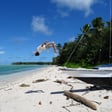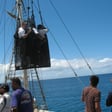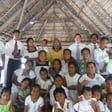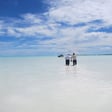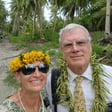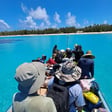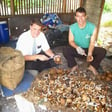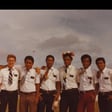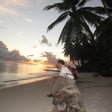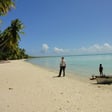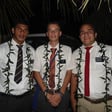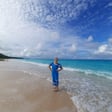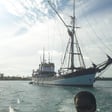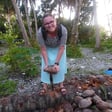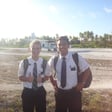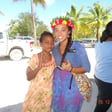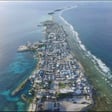Introduction of Terela Oliphant and Personal Connection
00:00:01
Darin Tingey
All right, we're on with another episode of the Islands Podcast. Today we have a special guest, our first, I guess, non-missionary that served in the Marsh Islands Kiribati mission, but ah I feel like everyone that served in Kiribati probably knows her at this point.
Terela's Childhood and Background
00:00:20
Darin Tingey
We have Terela Oliphant.
00:00:23
Darin Tingey
ah who teaches a Kiribati class at BYU and is from Kiribati, Bonnebe, Rampi, like kind of the whole shebang. And I took her class at BYU after the mission.
00:00:39
Darin Tingey
And so what better person to have on to talk about Kiribati than someone from Kiribati? um So today will give a little a quick background. I mean, we're going to dive into this of like your whole background, like growing up
First Impressions of Kiribati
00:00:53
Darin Tingey
and stuff. But I guess. But let's just start from the beginning. Where did you grow up?
00:01:00
Tereua
Maori everybody. i ah Like he mentioned, my name is Terewa and I actually was born and raised, fortunate enough to be born and raised in Fiji and grew up most of my life in Rambi and some of it in Suva.
00:01:21
Tereua
And then i moved with my family to Bonnabé in 2005. And funny enough, growing up is like I've always known myself as a Bonnabé.
Displacement and Cultural Impact of Bonabans
00:01:37
Tereua
And um when we first, my my dad, the reason why we moved to Kiribati or Bonabah in the first place was my dad was a reverend for the Methodist church.
00:01:50
Tereua
And he got um he got posted, that was his first posting as as a reverend to go and be a a missionary in Ocean Island in Bonabah.
00:02:02
Tereua
And when we got, ah we I was 13 the time. i was so excited because, you know, this means new adventure for our family, not knowing what but lies ahead, right?
00:02:16
Tereua
And so when we got there, um well, we we got our family ready. We actually got on a boat, the one of those boats that travels between Fiji and Kiribati.
00:02:29
Tereua
And we spent about two weeks, almost two weeks, I think, at sea just voyaging to to get to Kiribati. My first thought of Kiribati was I have no idea. like you You know, you look at me, I look Kiribiz and everything, but I did not know much about Kiribiz growing up, to be honest, until I got i finally got to Kiribiz to realize that I'm also e-Kiribiz.
Mixed Heritage and Language Loss
00:02:58
Tereua
Like, that's part of me as well. But when we got there, the first time the first impression of Kiribiz, while on out on the boat, um we couldn't see.
00:03:10
Tereua
This was a very different... um like geographical you know it was ah very a very drastic geographical uh change for us because we come from rambi and rambi has like this very lush green um like we have hills mountains and stuff to come to be to come to kiribus and be told oh yeah we're in kiribus the very first impression that i was what
Cultural Blending in Fiji
00:03:39
Tereua
looking for was like oh
00:03:41
Tereua
I'm not seeing anything. Like I cannot see anything. Like I was hoping for like, you know at least like a bump or something like, you know, but that was my first impression.
00:03:52
Tereua
And I i remember thinking as a 13 year old, I'm like, people live here. like
00:03:59
Darin Tingey
Right, right.
00:04:00
Darin Tingey
Six feet above sea level. and
00:04:03
Darin Tingey
And let's let's back up a second. So let's talk about... And maybe you were getting to it, but Rampi, am I pronouncing that correctly? Rampi?
00:04:14
Darin Tingey
So Rampi is an island in Fiji that all the people from Bona Bay went to, right? After... um Bonne Bay was known for being mined for phosphate. The British ruled it.
00:04:28
Darin Tingey
And then after the mining and World War II and stuff, it was like, hey, this isn't livable. We're going move all of you too an island in Fiji, which they had purchased from another European, I believe.
00:04:40
Darin Tingey
And that's where all the Bonnebians went to. Is that correct?
00:04:43
Tereua
Yes, they got, we got, well, it's mostly, we call it displaced because
Identity Struggles of Bonabans in Fiji
00:04:50
Tereua
we were displaced out of our island.
00:04:52
Tereua
We were displaced out of our ah culture culture as well in Tarambi, which big like looking at it now as as as a Bonavan, it's like a blessing and a curse at the same time.
00:05:06
Tereua
But I would like to focus more on the positive things that has come out of that.
00:05:13
Tereua
Um, but yeah, ah like I wouldn't, my, my, my grandparents were the ones that, well, we're talking about two different people here. My grandparents from my dad were the ones that got, got moved.
00:05:26
Tereua
And my great grandparents from my mom were the ones that got, um, displaced both at the same time to Rambi.
00:05:34
Tereua
Um, but it's, it's been a, ah It's been a blessing to me um just looking through the experience that I went through. i wouldn't have that, like, you know, I wouldn't have lived in Fiji um and be part of the Fijian culture or like, you know, be exposing that if it wasn't for that displacement.
00:05:58
Tereua
But then at the same time, it's like um ah it was a lot of struggling to figure out who I am
00:06:07
Tereua
in this you know in this very new nation that ah trying to figure out where do I fit as and ah as a Bonoban or like, do ah do I call myself more Bonoban than Fijian, like you know as a Fijian citizen, right?
Physical and Cultural Identity Blending
00:06:25
Tereua
But yeah, it's it's both a blessing and a curse.
00:06:29
Darin Tingey
Totally. And I think it's interesting, I mean, and to hear you say, you know, I'm Bonobin, right? I feel like people from Bonobay, they don't say I'm Kiribati, right?
00:06:38
Darin Tingey
They say I'm Bonobin. It's different.
00:06:40
Darin Tingey
I think it's, I think actually it's ethnically a little bit different if I'm correct.
00:06:44
Darin Tingey
But they speak Kiribati. Is that, okay.
00:06:49
Darin Tingey
That's good.
00:06:50
Tereua
um this ah And this is something that ah really drives me in the field that I'm going into right now. um
00:06:58
Tereua
Because I remember, and this was the stories that were passed down by my, you know, you know my my grandparents or my great grandparents, that we used to have our own language, Banda, but used to have their own language then until we got, you know, um colonized.
00:07:18
Tereua
And that's when supposedly, and I don't know, i have not really read many books if that was true, but this is what I was told that we were forced to learn to have Kiribiz as our language now and that Banna is not a language.
00:07:38
Tereua
um or like ah they We were forced to have kind of like how English becomes a national language in some of the countries.
00:07:47
Tereua
So Kiribiz was made sort of a national language when they came to discover Barnabas and they were, you know, inviting all the Kiribati people to come and work on the phosphate company that Barnabas once had.
00:08:02
Tereua
And yeah, it became the national language to a point where we hardly know any words. We're left with just like ah two or three words, but we cannot put that in a sentence.
00:08:16
Tereua
And so like that, that, everyone, whenever they associate identity, right, or like cultural identity, they often refer back to your language.
00:08:28
Tereua
And it's such a shame
Journey from Rampi to Kiribati and Education
00:08:30
Tereua
that we lost that language because we call us ourselves Bonobans, but then at the same time, we're defined by the language that we speak. At least most of the people will define us by the language that we speak. And it's It's sad because, I mean, we acknowledge that language.
00:08:47
Tereua
We are a loving, we're able to express our cultural um heritage and things like that through this language.
00:08:54
Tereua
But then at the same time, it's... it's it's sad to be pinned down as like, oh, yeah, you're not much like, yeah, well, if you speak kid of us, you are kid of us.
00:09:04
Tereua
I mean, we are kid of us, like part kid of us as well, but this it's important to know the two different identities that were once there or that belong to you, right?
00:09:18
Darin Tingey
can can you Can you, and maybe Bonobin and Kitabas blood has been mixed so much that you can't, but like, for example, I can look, when I so when i was in the Marsh Islands, I could see there's Kitabas people and there's Marshes people, and I could tell the difference.
00:09:32
Darin Tingey
Can you look at a Bonobin and say, like, can you actually, like, do it look a little bit different than people from Kitabas? Like enough to where you can be like, oh, that's a Bonobin, you know?
00:09:41
Tereua
Yeah, i actually do cannot, which is that I mean, um because um not because I've associated, I've associated Kiribiz and Barnabas so much that I just feel like everyone to me looks the same.
00:09:57
Tereua
But we do have some features that are different.
00:10:00
Tereua
I'm sure I'm I think we, yeah.
00:10:04
Tereua
But I cannot, like, I will, always be i I'll be a terrible person to, like, okay, yes, are they Bonaban or are they Kiribiz? But, yeah.
00:10:13
Darin Tingey
Yeah, I feel like mike if my parents went to one of my parents went the Marshall Islands, they couldn't necessarily tell the difference. like i was like, oh, that's kiddo's person, that's Marshallese person. To them, it like they kind look the same, but like me, having spent time in both countries, I can pick them out like, that's a kiddo's person, that's Marshallese person.
00:10:29
Darin Tingey
So i just I didn't know if Bonnevay was like that or not. Yeah.
00:10:31
Tereua
Yeah, yeah i maybe back then, ah but now it's like, I don't know.
00:10:39
Tereua
i I have in my head what a Rambian person is like, or like look like and the Kiribiz person looks like. So yeah, that's maybe that, but like to
Life in Bonnabé and Educational Transition
00:10:51
Tereua
really do Banaba and Kiribiz is like, we're so blend that it's, yeah.
00:10:57
Darin Tingey
So do, what about in Rumpy, have Fijians and the Banaban people intermixed? Do Fijians live on Rumpy at all? or i guess I mean, you guys are Fijian, but I guess ethnically Fijian.
00:11:10
Tereua
The Itauke we call but we call that we'll call.
00:11:13
Tereua
We call them the Itauke, the natives, the locals, like the natives of the land.
00:11:18
Tereua
um vivid bit There's a lot of into um like interactions between the closing, um like the those islands that are close to us.
00:11:29
Tereua
And we've had, it's it's been amazing because i've um i when I was growing up, I know a cousin, like, you know,
00:11:38
Tereua
ah extended cousin of mine that married a Fijian and this dude is fluent in like in our language like he does not look anything like it but like you know you could tell that he's Fijian and everything but when he speaks he opens his mouth he's like it's like he was you know Rambian the whole time growing up
00:12:01
Darin Tingey
Right, right.
00:12:01
Tereua
Yeah, so it's it's it's been neat because we've also had um the blessing of some of our people in Rambi that have been able to learn not just Fijian language on its own, like but they've also that like they can speak to you in Hindi.
00:12:18
Tereua
Fijian, Hinduism, and you have English on top of it.
00:12:19
Darin Tingey
Oh, wow. Yeah, yeah, yeah.
00:12:22
Tereua
i not that i only know Fijian to an extent, but that's it.
00:12:30
Darin Tingey
so So you grew up in Rampi, and then you went to, from there, you went to Kiribati.
00:12:36
Darin Tingey
And it sounds like you didn't go to straight to Banabe. Did you go to Tarawa first?
00:12:41
Tereua
Yes. I went straight, I went to Tarawa and I spent, I spent one year in Tarawa because um we weren't sure what the living conditions were like in, um in Barnabe because so much has changed scenes that like we can't rely on.
00:12:57
Tereua
We've heard stories of people that have been posted to go work in Barnabe, the struggle that they go through and then let alone like, you know, bringing four kids at the time, five kids at the time with you.
Living Conditions and Challenges in Bonnabé
00:13:11
Tereua
ah How do we even, you know, um yeah, how do we ah ah survive?
00:13:17
Tereua
So my parents and my youngest brother um have the opportunity to go first and see what it's like if it's good enough to invite the rest of us. If not, we'll just stay with relatives on Tarawa until and then just go visit during the holidays.
00:13:33
Tereua
Right. um But I had the opportunity to stay Kiribati. I lived in Peso for quite a while. i and I even attended the the junior secondary school over there for the first um term.
00:13:49
Tereua
Oh, no, the second term that the school started. And ah i remember when I first entered into my classroom, I opened my mouth. I thought for myself like i thought myself for myself, I can speak Kiribati really well.
00:14:04
Tereua
I mean, I do speak Kiribati really well. But when I didn't realize when I opened my mouth that I had an accent.
00:14:12
Tereua
And it was a strong Fijian-influenced accent. And so my peers at the time, they were making fun of me because they're like,
00:14:20
Tereua
you're such a fake Kiribati speaker. Like, you know, what how could you speak Kiribati with a different, like, you know, with this very strong.
00:14:28
Tereua
And it really, it it it really drove me so like to a point where I had about what about a month or two in Kiribati and I was able to pick up the accent, the Kiribati accent.
00:14:44
Tereua
The next time we went to a family gathering our in from our Bonoban side, our Rambian side, and everyone, you know, we had
00:14:54
Tereua
cousins who've come before us like two or three years before us with a still with a strong or strong Kiribiz Rambian accent right so they were all chatting and then this me remembering when i first started chatting with them that like my Kiribiz accent was stronger than any like than my Fijian accent and they looked at me and they're like
00:15:19
Tereua
how long have you been here?
00:15:25
Tereua
They were shocked. That really motivated me because I want to fit in with my peers. I don't want to be seen as ah as an outsider ah get like you know being in your own But yeah,
00:15:41
Tereua
that that was a good that was a good experience
00:15:46
Darin Tingey
Because, I mean, Kiribati has strong ah accents within the country. But, yeah, you can definitely tell, just like America, right? We have strong accents within the country.
00:15:57
Darin Tingey
But you can tell and when someone has an accent that's not from the U.S. or from Kiribati, they obviously could tell, oh, she's not she's from she's not from here, you know?
00:16:09
Darin Tingey
um So I bet that was hard to to fit in there. So did you go Bonne-A-Bay soon thereafter?
00:16:18
Tereua
Yes. So after I spent a year in, um, um, on Tarawa, we, um, my, my parents came and got us to go to and live with them in Bhanaba. And so I was there, I left, um, I was in Bhanaba for a year and then I, um, uh, uh, I got, uh, I got into a boarding school cause I had to, to sit for an exam, the, the national exam that they did to get into a high school.
00:16:47
Tereua
And ah when I got um accepted into a high school, I was accepted to one of the high schools on Tarawa. It's the government school, the KG5 and EBS.
00:16:59
Tereua
And i that's where, um so I only spent about a year on Barnabe for that fair bit of us staying in Kerebes.
Educational Aspirations and Family Dynamics
00:17:09
Darin Tingey
us what Bonne Bay was like, because heard it does, it is more have a hill or a mountain. i don't know if it actually is a mountain, but...
00:17:18
Tereua
Yes, it's actually because the whole story of Barnabas for me is more of a um like listening to what your your your grandparents or like your great grandparents tell you while you're in Rambi, not having any idea what Barnabas looks like.
00:17:38
Tereua
um But the very first ah one that came to mind when we, because we have to, there's no airstrip, first of all, on the island.
00:17:46
Tereua
We have to go by a boat. And by boat, I don't mean like those big boats. It's like the double hulled boats. That's what we usually go. Sometimes when we're lucky enough,
00:17:58
Tereua
the the Like they they have pickups for the the students um to, you know, to take them to different islands for high schools. Then they have the bigger, bigger boats. Right. Which is not very, you know, it's much safer. i felt But those journeys to Bonnaba is
Exposure to LDS Church and Conversion Journey
00:18:16
Tereua
is quite the experience on those.
00:18:18
Darin Tingey
How long is it?
00:18:19
Tereua
dot right It's about the boat or the journey.
00:18:23
Darin Tingey
No, the the journey. how Is it like hours, days, or what?
00:18:28
Tereua
It's days. It takes you days. It's about like ah when um and I can't remember because so if I think. Yeah. So when we go to Panabé, they always call it like.
00:18:43
Tereua
Si pate de. which is like, you know, we're going down. we're We're going with the current, right?
00:18:49
Tereua
So it's like smooth sailing.
00:18:51
Tereua
But to me, that was not smooth sailing. Like they call it smooth sailing, um having the double, the front of the hull, like the front of the hull, the front hulls, ah the boat, like, go down in the water, up, and then shaky boat, and then, like, that was the journey there, and then back, and I'm like, I don't know what smooth sailing is, it's just not, so it's, it's always, um the journey to Bana, but feel like for me was always, like,
00:19:19
Tereua
ah like a test of faith because then i find myself so close, like how many father, I'm just right there. Like, you know, because of how the number of prayers that I would have said on that journey. Um, and then back and, you know, looking back at the, the, the,
00:19:38
Tereua
the The accidents that have happened on those boats, just, you know, not Tubana, but the other neighboring islands, it's like, it really ah brought me back to those, like those humbling moments where ah seeing the Lord's hand in that journey
00:19:56
Tereua
back and forth, despite how young I was at the time. And, you know, but just being brought to the island and then back safely.
00:20:07
Tereua
um But anyways, when I got to Banaba, well, the the seeing the island approach, I could hear my
Family Reactions and Educational Path
00:20:15
Tereua
grandpa from my dad. He's like, when you see Banaba, like from a distance, you look you look at it as a capsized canoe, like, you know.
00:20:24
Tereua
But when you come to it it's like it's more rounder, which made you wonder how in the world is that like you couldn't really tell if it was a capsized canoe or if it's like a rounder island. Right.
00:20:42
Tereua
It's more elevated from the sea level. we have um we barely have a lagoon. No, we don't have lagoons in Bonnaba. ah What else?
00:20:55
Tereua
It's i I remember when I got out of the the boat and then walked up the hill to where our house is. It was a lot of like I had I was breathing hard.
00:21:07
Tereua
That was how high but like compared coming from, you know, Tarawa, which is flat to Bona.
00:21:12
Tereua
But there was a very change in elevation for. Yeah, for me.
00:21:18
Darin Tingey
did Does everyone kind of just live on the outskirts of the island, like along the coast, basically, because the middle, if I've done my research correctly, is where all the phosphate mines were, and there's basically nothing in the middle anymore. Is that right?
00:21:36
Tereua
Um, it's, it's not really the outskirts because you, you can't really, um, like people just live cause it's, it's like, it like I said, it's hilly, like, um it's, it's like higher up.
00:21:50
Tereua
And so people just live like from the, um, the, I think the the though the one that is
Experiences at BYU-Hawaii and Cultural Adjustments
00:21:58
Tereua
inhabited is more of the back area where they've done so much mining back then.
00:22:03
Tereua
um Yeah, but it's still um like, yeah, this the ah surface of the island and then just somewhere... Like all over. But you'll you'll see for yourself, like when you go there, you'll see like sharp rocks pointing out.
00:22:20
Tereua
And that's from um the the mining that has happened. We have more. how about this? We have more of those sharp rocks than we could have of coconut trees on the island.
00:22:33
Darin Tingey
No way. Wow. That's crazy.
00:22:38
Darin Tingey
Were there any other like fruit?
00:22:39
Darin Tingey
Was there like bananas and mangoes and other stuff or or not really?
00:22:45
Tereua
There is mango, mango grows really well on Barnabas, including papaya. Like we will have fresh papaya or like fresh mango when it's mango season.
00:22:58
Tereua
um We have root crops, which is not that hard to to plant. um And i when I say root crops, it's not like taro, you know, you you kind of need a very like wet land or moist.
00:23:14
Darin Tingey
Moist, yeah.
00:23:16
Tereua
Yeah. But we have tapioca or cassava um and that grows really well in a very dry, you know, um but we, we have pumpkins.
00:23:27
Tereua
um What else? Like just about anything grows well if it's not drought season, right? Yeah.
00:23:34
Darin Tingey
Okay. What about breadfruit? Did you guys have breadfruit? The may?
00:23:38
Tereua
ah Yes, we do we we do have breadfruit as well. But yeah.
00:23:44
Darin Tingey
i I, for some reason, I imagine ah like, uh, Barnabas being really dry because everything i've read about it is like, it doesn't have a lot of water necessarily.
00:23:54
Tereua
Oh, trust me, what you read is true because it's we've had and just to give you a little bit of um my, ah you know, living on Bana.
00:24:07
Tereua
But I we come from Rambi. Rambi has like rivers. Right. So we have 24 seven water available to us. um fresh water, not just salt water.
00:24:20
Tereua
But when we got to Panabé, I was quite shocked at the the water um situation that we have um to deal with.
00:24:31
Tereua
On Tarawa, there was no problem because you have the well, right? You can just draw water anytime you want.
00:24:36
Darin Tingey
Yep. Yeah. Okay.
00:24:37
Tereua
But when we lived in Panabé, I remember the house that we were assigned to live in has this huge, like, very huge cement tank.
00:24:51
Tereua
Like, When I say cement, it was built, like they build it out of concrete and made it into a water tank. And if we call it, up ah it's sort of a well ah for us because we still need to um get water out of it, right?
00:25:09
Tereua
but it's it's so big that that's where we still still water but that water um who knows how long that water has been in there and the the the tanks have like the tanks have this wide mouth like it's like those wide mouth jars so we have we have wide mouth to be able to get water out of right
00:25:32
Tereua
but whatever, like who knows whatever that's been in there and things like that. So it's, it's very, it's a struggle for us to find fresh water all the time.
Teaching Kiribati at BYU-Provo
00:25:46
Tereua
boiled water every time when it rains, We use whatever thing we can, including because from Barnabas was when when the phosphate company was going on, it was a very well off.
00:25:59
Tereua
Like it was a rich, rich island. Right. So the remnants of the things that were left behind, like bathtubs, those bathtubs, um like when I say bathtub, like your bathtubs.
00:26:13
Tereua
Right. So we would use those so to store water in. like when it rains like that's where we keep our water we also have those um uh tanks the small tanks like the small drums we call them not tanks but drums from like kerosene or things like that we've cleaned out really well and that that's our other form of you know water storage um but when water like When we're out of, because the big tank of cement, the cement tank, when it's out of water, we usually call for the like call to the council to come and bring us, like we'll pay for our water to come and be delivered.
00:26:57
Tereua
But then sometimes that water, what?
00:26:58
Darin Tingey
From Tarawa or where?
00:27:02
Tereua
No, for within the island.
00:27:02
Darin Tingey
Delivered from, okay, okay.
00:27:04
Tereua
Within the island. um That's when we rely... rely on the desalination... we rely on the ah sell it this sal nation
00:27:14
Darin Tingey
Yep, that's right.
00:27:15
Tereua
Like when they when they change, yeah, they change the water too. But those are not reliable but all the time.
Language Preservation Initiatives
00:27:21
Tereua
those Those are not reliable because we often have, we have, ah the they ah for as long as I've stayed in Bona, but we've had that machine broke a bunch of times more than we've had water delivered to our house.
00:27:35
Darin Tingey
Thank you. and
00:27:36
Tereua
And then if that doesn't work, if that doesn't work, if the machine is broken, then we have what we call a million gallons. Like we have these million gallons that are up on a hill somewhere um ah that they would go and draw water from because those million gallons, whenever it rains, it just stores those water.
00:27:57
Tereua
But if you look at this million gallons, like they've rusted and things like that. But that's that's the only source of water besides salt water that we can drink out of.
00:28:08
Tereua
um But yeah, we've had a fun share of water experience um when living while living out in Banabaya.
00:28:17
Darin Tingey
Yeah, it seems like, i from what i read, there's it's been through droughts and but people a lot of people died for a couple of years because of the droughts and that they used to capture water in in caves and stuff.
00:28:28
Tereua
Yeah. It's when you're never, yeah. Yeah. Whenever um something, whenever a drought is told about Bonabent, I like, I feel it from, from my end because that is like, that's true.
00:28:45
Tereua
Like what's going on right now. Like I know firsthand what it's like living in, out in that, on that Island without water and then because like we we have this we have the banga banga which is where this fresh water like but the the spring that comes out it's like yeah i'm in a cave like you really need to go to inside to get to get that water but we've been told that as soon as you bring that water out it stinks
00:29:05
Darin Tingey
Spring, yeah.
00:29:19
Tereua
It's like when it's exposed. So it's like and no one can drink it.
00:29:21
Darin Tingey
and Interesting. thing
00:29:23
Tereua
Like it's like we don't like we won't rely on that when but um when we're in drought. And I don't know, it's it's just a lot of um water challenges whenever that happens.
00:29:36
Tereua
And I hear about it and I'm like, yeah, that is I feel for my people back there know of knowing what they're going through.
00:29:47
Darin Tingey
Yeah, you you wonder, like, you know, how do how did these people survive this island, you know, for so for hundreds of years, thousands of years, whatever,
Showcasing Kiribati Culture and Strengthening LDS Ties
00:29:54
Darin Tingey
with with not as a strong ability to capture water in big tanks and whatnot, you know, it's like...
00:30:03
Darin Tingey
It's just crazy they were able to do it. So in with Bonnevay having the phosphate company for so many years, is the housing kind of, ah I guess, Americanized or Westernized, or do they do they live in traditional kidubus thatch houses?
00:30:21
Tereua
um It was most the housings most of the housing there were very westernized. ah we have like we have we We have double story buildings, like apartments.
00:30:34
Tereua
mean Yeah, we have those. They're very run down, but Some of ah the people when I was living out there, they've made like they've renovated it just to have the portion of the huge, you know, torn down building or like, you know, run and run down building, just have the portion of it livable for their family.
00:30:53
Tereua
And so for that, they own that whole block. what It's it's been fun to see but them reusing
Advice on Learning Kiribati
00:31:00
Tereua
what's left from the um the phosphate company.
00:31:05
Darin Tingey
Yeah, and how many people live on Barnabé normally?
00:31:12
Tereua
um When I was there, I think there was about 300 people. There's not many of them. There's not many people um out there. um One thing that we got to be aware of for Barnabas, it's more of a um the custodians of the land are those are in Brambi.
00:31:30
Tereua
And so they're the ones that are in charge of like they have a say of what needs needs to be done um on Barnabas.
00:31:39
Tereua
And ah for whoever that needs to go to Bonnabé, it's, it it has to be, um, they're very, um, they're very careful about this, um, ah of who they let in.
00:31:55
Tereua
And so it's, it's, it's, you need to be approved to go in to Bonnabé before like anything. And I don't know if that's still the case, but that's what I heard.
00:32:06
Tereua
Um, ah For anyone that wants to come to Banab, like, you know, even from Kiribiz, it's like we we hardly um have what we call Teirua, who is not of Banabin descent, though, like from Banabin, come.
00:32:23
Tereua
um because the people ah like you need to be approved to come in and I don't think if that's still the case now like with everything that's happening yeah but this there's been a strong push right now that we need to keep Bonnaba for the Bonnabans right but yeah hi I'm not quite sure ah it gets political in that end when you think of it right
00:32:51
Darin Tingey
Yeah, which is always interesting because like Banabe is like a part of Kiribati but Rampi a part of Fiji but the people Rampi are Banabean so they still control it which is an interesting dynamic.
00:33:04
Darin Tingey
um So you spent some time Banabe then you went to a boarding school back and in Tarawa, right?
00:33:13
Darin Tingey
And is this where you found the LDS Church?
00:33:18
Tereua
I actually learned of the LDS church. um Well, I didn't learn of the church first. I learned the about the the high school at first.
00:33:29
Tereua
And so when I was out in Bonavent, I really wanted to go to an English speaking school.
00:33:36
Tereua
And I was told, oh, Morinai is an English speaking school. um So you can like if when you're in form three, um I don't know what grade that is in in the U.S. But when you're in Form 3, you can apply when you have, you know, to apply for which high school you want to go to.
00:33:53
Tereua
You can make Moronai as your first choice. And so I was, you know, so a teenager. My parents were still in control of me at the time. And so I was I had no choice.
00:34:06
Tereua
to put like I had I had no choice to put down Moronai as any of my choices at all like they want it to be KG5 and EBS which is the government school uh for government sponsored school and then they the next two ones were like not Moronai like and they they don't want anything to do with Moronai and I have no idea why like I was still naive about why there's that you know um
00:34:34
Tereua
um they They're very ah not um open to the idea of having me go. ah So I got into, luckily I got into my first choice of school, which is the Govan Ponset School on on the island, on the main island, Tarawa.
00:34:50
Tereua
And spend from four, five, six, ah and then seven um in the high school. But the whole time while I was going to my, KJV Phinebias, my heart was yearning. Like, you know, i really wanted to, I wanted to go to Moronai, but oh well.
00:35:12
Tereua
And then, um I ended up actually staying with a ah member family. i did not know this, but I had um i had i had a friend um who was going to the same high school as me.
00:35:27
Tereua
ah We, well, we go to the same high school together. i had just learned that she had found, like she had she's a Protestant, right? And Methodists and Protestants, we tend to like, you know, um get get together better than and us and any other, like any other religions.
00:35:46
Tereua
Right. And so i when I found out that she had just joined the Mormon church, I was like, nah, ah now it's not happening. this is not happening.
00:35:58
Tereua
Your parents are strong Protestants. They're going to be so mad at you and things like that. And me being like the good um Reverend daughter, I'm like, I need to save my friend. I don't know why what she's doing. Why is she...
00:36:13
Tereua
And so I i started, i made it I made it a goal every Sunday. to go and pick her up, go pick her up so she does not have to go to attend her um service at the Mormon church.
00:36:27
Tereua
And so I made it, I came pick her up and we go to the Protestant church. That's been happening ah back and forth every Sunday.
00:36:36
Tereua
And I was very proud of myself. I'm like, oh, my, my, my, my parents are going to be so proud. My, um my, her parents are going to be proud because, you know, I'm still keeping her where she actually belongs.
00:36:50
Tereua
And then ah things didn't go well with my living situations. I had things come up in my family. And so i had like i I had to run away from from my my my my my my mom.
00:37:04
Tereua
I had to run away from her. And ah this friend, the one that I've been inviing ah inviting, was like, invited me to stay with her. And she's already staying in her... um enough in like with her guardians that are members. Right.
00:37:21
Tereua
And so when she heard of my um situation, she's like, well, she won't find you here. Come stay with me. And it's very convenient as well, because at the time her, her house or like where the family was saying is right.
00:37:34
Tereua
Like ah behind the house was the high school that we go to. And so it's right there, walking distance. We don't need to spend money on bus fares or anything. And so I stayed with them for a while.
00:37:47
Tereua
And that's when, um like, I... They... they they It helped me. um That... I felt like whatever... ah challenge or problem that I was going through, i was being prepared for something else, right?
00:38:04
Tereua
Looking at it now. um But ah when I was sitting with them, I really liked sitting around in family home evenings, like, because it's not very cultural to sit around and ask, like, you know, ask how they, like, ask just about anybody, especially like the, the, the,
00:38:25
Tereua
the the elderly in your family, you know, to be asking you, like, be interested in, you know, wanting to connect and like, just talk to you. Right. And then at the they express how much they love each other and things like that. And so I was, I find it very interesting But like more of it in a good way, because we've never really like we would sit down for family home, like for for, you know, um oh what do you call it?
00:38:54
Tereua
Kind of like family home evening where we we read scriptures, sing and then like that. But we don't. We don't, uh, uh, counsel as a family after.
00:39:03
Tereua
And I find it very interesting when that happened, like during that, those family home evenings, the counsel that we did after. And it really, it really helped me see the church in a different perspective.
00:39:17
Tereua
Right. I was like, Oh, they're not terrible people at all. Like, like, Oh, I don't know.
00:39:23
Tereua
Like all this lies. And then, um, Not long, not long, while staying with them, not long, the two missionaries happened to stop by.
00:39:40
Tereua
happened to star bya Happened to stop by at the house. And then, ah you know, being polite, being polite in Kiribati, when they were asking, they they they they came and connected with us.
00:39:55
Tereua
And then they're like, okay. um Hey, are you guys interested? That's when they started opening it up, right? Are you guys interested in um coming in, well, not in having us come back so we can share with you guys the message and, you know, whatever things.
00:40:12
Tereua
And we're like, oh, sure. why not? Like, come come back. And um at the time, it was elder Elder Piki with a ah member present because they didn't have a companion at the time for him.
00:40:26
Tereua
ah But it was I could feel the the the tension that I was giving my missionaries. It was not a smooth sailing for them ah because i have being well-trained well like being raised in, in, in the Bible and everything like, you know, this was, ah there was a lot of bashing, like, you know, doctrinal bashing for me and the missionaries, my poor missionaries at the time.
00:40:54
Tereua
um But I remember, um I remember when um they, they, they, like out, out of all of us, there was about, I think there was three of us that were being taught at the same time that we're living at the house.
00:41:08
Tereua
Uh, but out of all of us, like they, like I was the tough one to be, to be part of the group. And then when it came to the invitation, we've had, um,
00:41:20
Tereua
oh you know, a long, um, lessons of back and forth. And then, when they came to, ah for them to invite us for baptism, um and I was, I was the first one to, to, to accept the the the invitation.
00:41:41
Tereua
I was, this ah but and it got them by surprise. It did got them by surprise that I, you know, I was ready. Which was very, um on my end, was a very ah fortunate thing for me because I had just turned 18. Like i had just turned 18 and this was a few months after I had just turned 18. So I can like make that decision for myself without needing the approval of my mom, who I know will be like at the time was like,
00:42:11
Tereua
No, you are not like, you know, we'll be very against it.
00:42:15
Tereua
But it was, it was the timing of everything was just perfect. um When that happened. And I was i like, that was perfect. Yeah, that's my journey to becoming a member.
00:42:29
Tereua
um it was It was a good... it was a good i just remember um with everything, with every conflict that was happening in my life, there was still that peace that I was able to find.
00:42:40
Tereua
It was centering me. to know like, you know, that the the hope that it was giving me that no matter what this, because at the time I was worried i need to get a scholarship to go, you know, to make it further. Cause I don't want to be stuck at, um I don't want to be stuck in, in Kribis and not, you know, be able to do anything. I want, I love learning and I want to find opportunities that that will provide me that. And so when I got,
00:43:12
Tereua
Like, because it was critical time at the time um being in Form 7 to find if you get a scholarship or not. But things were not going well. Like, it was just a lot of um oh conflict in my end and my family at the time. And so...
00:43:31
Tereua
I remembered right after that. I just remembered being at peace with myself that whatever happens after Form 7, like, there'll be other opportunities that may, like, that will open up, but it may not be the same um ah opportunity that I'm, over with like, already um down for, right?
00:43:52
Tereua
Like, I'm already um um looking um looking at or, like, focused on.
00:43:59
Tereua
And i Like I remembered, ah after I had joined the church, my, my dad found out he was in Fiji at the time being, being a reverend for the Methodist church.
00:44:12
Tereua
And he was not happy. He came, he came to get us to come and get us. Um, because not that I only joined the church, um, at the time, my, um, I invited my sister to join with me so that when I have, when I'm in trouble, I have someone to be in trouble with.
00:44:30
Tereua
Like we're sharing that.
00:44:33
Tereua
It's such a sisterly thing to share, you know?
00:44:36
Tereua
Um, um, but my, um, what was it? My, my dad when he came to pick us up and he found out he also found out that i had just been accepted to brigham young university hawaii to go and study but there was little ah that they know about byu hawaii for them it's like for them and this is my mom as well for them it's me going to learn more about the church and becoming their missionary for the church which is very against, like, you know, we'll clash with my dad's call as a reverend for the Methodist church, right?
00:45:14
Tereua
So my dad came um came over to game back to Kiribati to pick us up. And throughout the me, the like i was so I was so fresh in the gospel. My faith was like, I was so wholeheartedly that there, like present, right?
00:45:30
Tereua
um And um when he came one night to visit me at this family's house, and I was like, you know what? i I love and value the things that he's doing.
00:45:46
Tereua
But the the one thing that really strikes me the most is the missionaries that are this young that have like leave everything behind and go serve but without like, you know, the the the sacrifice that it it takes them to so come out here.
00:46:04
Tereua
That was something that really happened. um Like it it hit um it hit me very, like, because when we think of missionary, we think so highly of themselves, like we see of them that we're willing, like we've we've made them so high um that we sort of worship them.
00:46:27
Tereua
Like not worship, worship, but like we've treated them differently.
00:46:31
Tereua
Right. Right. And that was me growing up as a missionary daughter.
00:46:35
Tereua
Like I felt like I'm like important than anyone else. If like, that that's just the, the feel that, um, and I didn't, I didn't feel good about it.
00:46:46
Tereua
Like I didn't like, that there was nothing good. ah Like I didn't feel good about that. um But and I mean, my parents are very humble. My dad is very humble. But it's it just wasn't right for me to be put up here while everyone else will have to serve you right to be to hold that position.
00:47:07
Tereua
And that really, like when I heard about the missionaries and the things that they have to sacrifice, and it just like, it draws me more to learn more about them, um learn more about the church.
00:47:19
Tereua
And so, um yeah, i like i there was no, that the, the,
00:47:23
Darin Tingey
So were your parents super mad?
00:47:27
Tereua
They were like, my mom was super mad. My dad was not happy. um And then he, um like, he came to pick us up to go back to Brambi and be there.
00:47:40
Tereua
But I remember when he came to visit me that that night, I presented him with True to the Faith.
00:47:48
Tereua
If you remember that, like, yeah, I presented him like, you know what I know that you don't understand. You don't know much about this religion. But this is his a book, his book, that a handbook that will help you understand just a little bit of what the, you know, we still worship you the same Christ.
00:48:07
Tereua
There's not nothing, you know, um the different about that. And so I don't know if he read it. I never asked him. But a few days later, like I never heard from him.
00:48:19
Tereua
um And then a few days later, he came back and he opened up like he he was um chatting with me. And then he he opened up um by asking me if about the university that I just got accepted to BYU Hawaii.
00:48:38
Tereua
And I was like, oh, yeah, I really got accepted to this school. Like, you know, I have this up like, you know,
00:48:45
Tereua
to the opportunity to go further my education at this place and he's just like you know listening to everything that I was explaining to him and then ah after I had said what I needed to say um he reached out and just like you know um you know, in an embrace, he just embraced me. And and he, I remember the the very words that he said was, I will let you go. Like, I'll let you go on this opportunity.
00:49:13
Tereua
I'm not going to stop you. um Because then I've, I failed my part as a dad to, you know, to, the the I want to, to um what i could it to so be supportive. If this is where opportunity awaits for you, i will i will i will let i will let you go.
00:49:33
Tereua
I will support you. um But whenever you come back and visit me in Rambi, like that's when you give me the respect that I need as a reverend of a Methodist church and come join church with me, like, you know, come attend service with me.
00:49:50
Tereua
And it was... It was have that um blessing from my dad, it it brought like, ah like it just ah give me reassurance that um this is where I need to go.
00:50:08
Tereua
Like this is what's going to need to happen for me and to have him um bless me in that really supports me in in that journey. Right.
00:50:19
Tereua
But yeah, it, it, my, my mom was still not happy about it, but I've already got the approval that I need from my dad.
00:50:27
Darin Tingey
and And did they forever stay in the Methodist church? Are they still the Methodist church?
00:50:35
Tereua
um Yeah, well, my dad and my well, the funny thing is, um because um when he was back on the island, um i had someone from my home ward in Kiribiz served in Rambi.
00:50:52
Tereua
And um he would invite the missionaries to come and just, you know, ah like invite them for food or anything like there were more open to have the missionaries come and sit down with them.
00:51:05
Tereua
Then back when there was no like, you know, you know whatsoever, we're not sharing a meal with these guys. But yeah, that was a ah huge change.
00:51:17
Darin Tingey
That's so cool.
00:51:19
Tereua
um ah He had passed away in 2014, but we've been able, like, I've ah've been able to do work for him. So, yeah.
00:51:30
Darin Tingey
That's so cool.
00:51:33
Darin Tingey
So Hawaii, did you, so you go to BYU Hawaii, did you work at the Polynesian Culture Center? I feel like every student does.
00:51:44
Tereua
I did. i did. As part of the scholarship that I was on, it's the I Work scholarship. And i this has been a huge blessing for someone like me um because it it it really gave gave us the opportunity to be there to study.
00:52:01
Tereua
And at the same time, work part of our tuition um and with the donations that's been given, um like, you know, that also contributed to ah having helping us um financially over there.
00:52:16
Tereua
And yeah, I bet ah most of the the Polynesian Cultural Center is your first job. Like whatever ah the job that they have at the Polynesian Cultural Center is like ah we have that. That's where we need to start at Right.
00:52:32
Tereua
So that's where I worked.
00:52:34
Tereua
I actually worked until I graduated at the Paul Edison Cultural Center. So yeah, i worked as a tour guide and with my broken English, I was I was a ah ah proud kid of his tour guide running around um in my, you know,
00:52:52
Tereua
ah broken English.
00:52:53
Darin Tingey
That's awesome.
00:52:54
Tereua
um But it was it was a fun experience. Yeah.
00:52:57
Darin Tingey
So you learned English a little bit in high school then, and then you and then ah in college is where you mastered it, I'm assuming. um And is BYU-Hawaii also where you met your husband?
00:53:09
Tereua
um Yeah, well, Fiji is wealth. Yes. oh the but Continuing the story from my dad, that saying when he said, if this is where opportunity leads you, I'm not going to stop you.
00:53:22
Tereua
Right. um When I first I i got accepted a while back um to BYU Hawaii and things just not were weren't in line to me go to go right away until like a year and a half later after I had been accepted was when I went to BYU Hawaii.
00:53:43
Tereua
And my first semester, I met my husband there. If I had gone earlier, reflecting back on that, if I had gone earlier, I would have missed. I would have not. I mean, being BYU-Hawaii is, you know, being as small as it is.
00:54:00
Tereua
But you kind of like, you know, you have your grip when you're a senior or like, you know, freshmen. You can tell who the freshmen are, the sophomores and then the seniors. Right. But like I would have been like um somewhere like, you know, in between sophomore and, you know, junior.
00:54:16
Tereua
um So I would not have met my husband who had just... um Came off his mission and then he got accepted while while he was um on his like last week or something on his mission was when he got accepted into BYU Hawaii.
00:54:32
Tereua
And then he came back from his mission, spent a few weeks and then went for the summer semester BYU Hawaii. I came the fall semester and we met that fall semester. So, yeah, it's it's crazy how he was just aligning it for us.
00:54:43
Darin Tingey
Wow. So cool. Did you ever but you ever imagine yourself?
00:54:51
Darin Tingey
Yeah. Did you ever imagine that you'd marry an American?
00:54:56
Tereua
No, let alone anyone from Utah. um I didn't think I would ever end up, like I was going to end up, I had hopes to go back home and then like,
00:55:13
Tereua
Um, yeah, who knows what happens. But when I first ah met him, I like I was I liked him from from the very very beginning.
00:55:24
Tereua
Don't tell him that. But ah but he he was he he was just the kindest, sweetest person that I needed.
00:55:35
Tereua
um while out of while out there. Like ah he, um yeah you know, because you you come from an island, you have you go through a lot of cultural shock and things like that.
00:55:47
Tereua
And just having his presence it was just like really asserting that, you know, they're not bad at all. Like, you know, um especially coming from a culture that was um um like, that really um groom you to like, look, because we were, um the whole dealings with the phosphate and everything in Bhanaba was not, um was like, we felt betrayed that the dealings were not that great.
00:56:16
Tereua
um We felt betrayed by our white counterparts.
00:56:20
Tereua
Right. And so being groomed growing up was like never trust a white skin person. And so when I got here, god got gotten to know him, it really like just the love and um support that he gave me really asserts that, you know, not everyone is like that.
00:56:40
Tereua
um people People are different. And whether you'll you'll find nice people, you'll find really, you know, crazy people, things like that. you'll come they Every culture has that.
00:56:54
Tereua
So it really asserts that for me.
00:56:55
Darin Tingey
right what with the
00:56:59
Darin Tingey
What was the biggest like cultural shock or difficult thing culturally from you going from Kiribati to America?
00:57:08
Tereua
uh well let's see there's um uh escalators right
00:57:16
Darin Tingey
Yeah, yeah, yep, yep.
00:57:19
Tereua
that one there's escalators because because there's no escalator in kerebas back at the time now they have escalators which is good for them um the the the food and then just the cultural interaction and things like that it was
00:57:19
Darin Tingey
That was a hard one.
00:57:36
Tereua
For Kiribiz, it's more of an open, like, if my door's open, please come in. i don't need you to i don't need to invite you. If you see it open, come.
00:57:48
Tereua
Like, you know, call out.
00:57:49
Tereua
If I'm home, you come. Whereas here, it's it was really hard for me to, like... understand why like you know we need to call somebody up just go to go see them that was that was a very um hard thing for me because we're a very social people right we we want to go see whoever when we know that they they're like ah just show up anytime and you know but here it was like it has to be organized so that was a cultural um big cultural shock for me and big cultural adjustment as well right oh
00:58:25
Darin Tingey
Yeah. I think that's one of the things that the missionaries love when they go to Kiribati is like how open and friendly everyone is.
00:58:33
Darin Tingey
and And in America, we just don't have that really. It's not, you know, it's just not a part of our culture to just have your door open. Anyone can come over, you know, we're eating, anyone can come eat with us, you know, all that stuff.
00:58:45
Darin Tingey
It's so different in Kiribati and it's so friendly and community, you know, the, the village really is working together.
00:58:51
Darin Tingey
And it's one things we love about Kiribati. What was something that your husband had a kind of a cultural shock with when like, maybe he went to Kiribati with you for the first time or Rampi or just Kiribati culture in general?
00:59:07
Darin Tingey
was hard for him, you think?
00:59:08
Tereua
Oh, um the one thing that was, um and I should have had him here for that one, but I feel like the one thing that was hard for them was being told, like like being told what to do as an adult.
00:59:27
Tereua
Because, and I had to explain this to him, right?
00:59:30
Tereua
When he first came and met my family, like he had to like, my mom was like, oh, you should go shower. Oh, you should like, you know, you should eat now. Or like, oh you should sleep. but Like, you know me.
00:59:43
Tereua
But what he didn't understand, like, i mean, he could do that himself. Like, you know, he's used to not having his mom tell him by being as an adult.
00:59:52
Tereua
Right. Or like even as a teenager, like, you you know, but in Kiribati, it's more of a the the reason why they do things like that. And this is something that it's good for everyone to know.
01:00:04
Tereua
like when they actually like when you come home and they're like, oh you're home, like, you know, um or like when you're about to go somewhere, you have to let them know oh I'm going this way. Right.
01:00:16
Tereua
um That's for them. That's just it's acknowledging your presence.
01:00:22
Tereua
It's not because they're controlling that you don't know what you're doing and things like that. But they're acknowledging, they're making sure that you're you're you're you're taking care of. like you like
01:00:37
Tereua
yeah they they want They want to include you and for like telling you what to do ah this for someone that is American like him. was like, I feel like, you know, an idiot being told that I need to shower. I need to eat. Like, I don't know how but how to do these things on my own.
01:00:54
Tereua
Like, it was, and I had to, like, I had to explain that to him. It's like, it's not, it's not because they, they, they, they they want to tell you like that they're trying to cook to control you that just wanting to um express that or like acknowledge that you're part of them right you're part of this community it's like it we we we want to make sure that because we don't speak your language really well and that may have come out too you know like in you know as offensive we do that the same way to our own people
01:01:29
Tereua
Like when i go visit when I go visit my family, my extended family, they'll be like, but like oh, go shower.
01:01:38
Tereua
Like, come eat. it's it's That's an inclusive ah in inclusive way of having you be part of of of of of those, but the gathering or the get together, right?
01:01:51
Darin Tingey
Yeah, that's that's funny.
01:01:53
Darin Tingey
It's it's fun to hear from your perspective, kind of what what it is. So that's I'm glad that I wasn't the only American to feel something similar as him. But so I want to jump forward a little bit to you teaching at BYU. And maybe we can talk a ah bit little bit about what you are doing right now.
01:02:15
Darin Tingey
But you decided, i don't know how exactly, but you got connected with BYU and realized there was a lot of missionaries that had returned from Kitabas and there was a need for a Kitabas language culture class at BYU in Provo.
01:02:31
Darin Tingey
And i was one i was luckily part of that first group to take your class. I felt a little bit of a little imposter syndrome because again, I only served in Kitabas for four months and then did a uh a kid of this branch in the marshals for other another four months so like my language was like way behind everybody else's but i i appreciate you always like realizing that and helping me through it and even to this day we do the same stuff right uh because i i feel like when i was on my an eye it was fine but then you know being gone from kid of us for so long you you kind of lose it um
01:03:04
Darin Tingey
But, ah and I just didn't have the full two years in Kitabas. So you taught that class and yeah yeah I think you continue to that class when there's enough demand for it. um So how has that been for you?
01:03:15
Darin Tingey
And then talk a little bit about what you're doing with Sister Johnson, that's her name.
01:03:19
Tereua
Yes, ae I actually that i need to um the the correct the the very about how this class come about.
01:03:29
Tereua
ah From what I heard, it was a bunch of moms of these missionaries that got together and were really pushing to for BYU, you know, why are we sending our kids to go learn this language?
01:03:41
Tereua
um Why can't we provide this when they come back to consider it as a language credit? So they don't have to go through the beginner classes for other languages that they're not good at, right?
01:03:52
Tereua
That you're considering as language credit. So why don't we count this? And that was how Kereba's class came about. It was from from these moms that we're but that we're pushing for BYU to offer it.
01:04:04
Tereua
And BYU looks at it and you know it it is it's true. like why Why are we not, if we're wanting to offer as much languages, why are we limiting ourselves to other like you know Micronesian language?
01:04:17
Tereua
Because there's no, and I feel like, I think we are the first Micronesian language offered at BYU, even before Marshallese.
01:04:24
Darin Tingey
Yeah, I think so.
01:04:28
Tereua
ah which is surprising. But yes, um ah my it's it's going great. i really um i Every time I get to have students or I get to meet students, um ah the this RMs that are taking my class and starting from you guys' as class, it really, um it brings me, it keeps me grounded.
01:04:52
Tereua
It brings me back to those humble beginnings, to how important it's like to find people like you guys to so value this language, to value this culture at the same time, and you know let alone to learn more of it.
01:05:07
Tereua
it It really keeps me going. it got me it well it it got me back two two in understanding why this, like the importance of this culture and language, again, outside, you know, outside of Kiribati.
01:05:27
Tereua
And so that was, that's something that I always am appreciative of for any student that's, kind that I come across and that takes my class or like that I've had the pleasure to interact with just to see the passion that they have and love for the language and the culture to like ah be wanting to be there even if they're not you know BYU or um
01:05:50
Tereua
you know, but are interested. Just, reminds me of how beautiful my language and culture is. And it helps, it motivates me. It's been motivating me to do further, to do more about like, ah you know, I can't just teach it. Like, I mean, i love teaching it to you guys, to any students that I teach it to, but that's it. Like, is there more that I could do but besides just...
01:06:20
Tereua
um you know, teaching it. And I've um come to realize of how, when I first started, there was so lack of a material. Like we were starving for materials um because we're not headed, you know, in Fiji, ah USB or anywhere.
01:06:36
Tereua
We're out in Utah. at alone um And ah the the only of of the the only materials that I found i found were like backdated, you know, or back we have not really had
01:06:49
Tereua
like updated works or anything like that that I could share with you guys, but just mostly from experience and whatever I can read from of the someone's um you know um journal writing about the cultures of Kiribiz.
01:07:04
Tereua
And it it motivated me because i knew what happened when we lost our language as Bonobans. There was no way we could, you know, recall that.
01:07:15
Tereua
But not that I'm saying that Kiribiz will be lost forever, but it it changes as we go. i I've seen them, of like, I've experienced the changes as as ah as ah as a language teacher.
01:07:26
Tereua
Like, I've seen the changes that are slowly being accepted without us realizing. um And that's when I was like, okay, I need to do something. And um I ah reached out to BYU to...
01:07:40
Tereua
to Like, i want I want to do more. I don't want to be just the teacher. What can I do to keep this language going or to keep to to have records of this language so that, you know, for the next generation? So who knows?
01:07:54
Tereua
And they they were telling me, oh, there's works that you can do like documentation, language documentation. i think that was the first time I've ever heard about language documentation. And so they they they they they asked me, um like, I asked them, what what can I like, how do I go about this documentation? Like, what needs to happen? Like, how do I do it?
01:08:17
Tereua
And so they they they they they connected me with the right people. And then um they also encouraged me to apply for the linguistics program um and heavily focusing on documentation.
01:08:31
Tereua
And that's where my journey, I mean, I've, I started Langsley Kiriwe. as you've, if you, yeah.
01:08:38
Darin Tingey
everyone go follow it it is the best place to learn the kid of this language it's honestly awesome you can find it on instagram give it on facebook too i know for sure instagram
01:08:48
Tereua
Yeah. um it's Thank you. Thank you for the shout out. I had, um that's when I started. That's the whole reason why I started Langsley Kiriwe in the first place.
01:09:02
Tereua
Okay, I will. I will. I will. There's dinner upstairs, you mean? All right, I will come. All right. Can you close my door? Okay. Thank you. But yes, um yes, I actually started Lang's Lake Kitty Way for the idea, of but for that thought.
01:09:22
Tereua
So like if if we can have our are our presence on social media because we don't have any platform at the time, um if we can have that, that's one way of us keeping the language alive.
01:09:36
Tereua
Right. um I mean, i if you've seen me slacking, it's because I've been busy with school.
01:09:44
Tereua
But I'm back, hopefully, to keep going. ah But yeah, that's where it all started. can't i why um I had to start Langs Lake Kittaway in the first place because and not I've had the opportunity and the blessing to connect with not just my circle, but even outside, like the those that are interested in learning Kiribati's language or those that are wanting to learn the the language of their mom um of their mothers or you know their grandparents.
01:10:14
Tereua
And it's it's it's it really has brought a big community of Ikiribu speakers or like Ikiribu learners, right, um to connect with.
01:10:27
Tereua
um That's my um my current i ah curring um thing going on right now. And then we have with Sister Johnson.
01:10:38
Tereua
i First of all, Sister Johnson was one of my students BYU. um She took my second class. ah for Kerebens Language and Culture.
01:10:49
Tereua
And then later on we connected and I love, this is what I love about these classes. um And I tell this to my students and if they forget, they forgot about it, please remember that you, if you've taken my class, you are my family.
01:11:04
Tereua
Right. now um No matter where you are, um how ah disconnected you felt like we are still like that Kiribati hospitality, that Kiribati love and things like that.
01:11:05
Darin Tingey
That's right. Love
01:11:16
Tereua
It's still there. So, yes, we're still connected. But um we are going to Kiribati in the next month. ah And, with yeah, our project that as she's working towards her thesis and master's thesis in at George Mason University right now.
01:11:36
Tereua
And I'm working on mine for linguistics. ah But her focus, she wants to portray the Kiribiz women um in this, the resilient Kiribiz women and in Kiribiz.
01:11:49
Tereua
And ah what better way than to portray our elderly women, the Unayine, that we have.
01:11:57
Tereua
And just from the telling the story of birth until where they're at as an Unayine. And ah ah that's, that's an exciting um project. It's,
01:12:10
Tereua
It's a selfunded ah projects she has self-funded self-funded this project. And i I hope like, you know, I think she's starting a GoFundMe somewhere.
01:12:20
Tereua
so if anyone is looking to, you know, to support the project, well, Kip and I out, I'll probably be sharing it more on our Langslade Kitty Way.
01:12:31
Tereua
I'll share about our GoFundMe project.
01:12:35
Darin Tingey
Send me the link and I can put it in the podcast notes.
01:12:39
Tereua
Yay. Yes. That'll be awesome. That'll be really helpful. So yeah.
01:12:43
Tereua
ah um But that's where we're at. And I hope to update everybody on Lang's Lake It Away while i' ah while i'm on while I'm back in cannabis. But yeah.
01:12:53
Darin Tingey
And I will also tag your Lang Slate Kidway on the the podcast details, of the notes, so everyone can go follow it. Because seriously, like especially if you're you just got your call to Kidabus and you want to start learning a language, this is the place to do it.
01:13:08
Darin Tingey
um I know you got to go to dinner. so like last... last question, well, maybe last two questions. and And before I ask those questions, for that don't know, the president of Kiribati came to Utah not that long ago.
01:13:24
Darin Tingey
I'll just give the quick summary, but basically, Torei was able to host him and and give him a piece of Kiribati in Utah. And they did the whole, you know, dancing for him, kind of...
01:13:35
Darin Tingey
everything culturally you can think of and brought the other returned missionaries. I'm sure he was like, wow, this is so amazing. You know, like this is BYU is incredible for this. And it really built strong relationships with the government of Kiribati and the church, which is probably another reason why we were able to build a temple there, ah which they're currently building. So huge, like a congrats to you for being a part of that. It's amazing.
01:14:00
Darin Tingey
Your footprint is so big in that. um I guess maybe advice, the question i have for you is like someone learning Kitabas, like what's your quick advice?
01:14:10
Darin Tingey
And then maybe something that you've noticed that like return missionaries still haven't gotten right in the Kitabas language. It might be like a difficult thing that you could help them recognize they need to get better at.
01:14:22
Tereua
ah I don't know. i feel like those that have returned, I feel like they know more than I I've been away from Kiribiz for 13 years now. they they they know more than i have i have because i've been
01:14:36
Darin Tingey
Yeah. Mm-hmm.
01:14:37
Tereua
away from kidtibis for thirteen years now um But yes, of those that are on um or like that are learning the language or new to learning the language for anything to do with Kira Bess language, it has to you have to focus really hard on your sounds.
01:14:54
Tereua
Right. And when I say sounds, it's not the A, E, I, O, U sounds. It's the how you, ah, A, E, O, U. Right.
01:15:04
Tereua
Those ones right there. Because it's hard when you come to L'Enquilibus and you're used to having E, the letter E is E or like, you know.
01:15:14
Tereua
the letter I as E. And so those two get mixed up a lot.
01:15:20
Tereua
um But yeah with Kiribati, it's a lot of, it focuses heavily on the sound, not the alphabet itself. And at the same time, the blending.
01:15:32
Tereua
the blending of those vowels because sometimes you thought you heard a like you you thought you heard ah sound of a vowel, but it's actually of two vowels combined together, right?
01:15:45
Tereua
And it happens a lot with most of our words.
01:15:48
Tereua
And sometimes sometimes when you're missing that vowel sound, it can like, you know, it'll give you, like as soon as you miss the vowel sound, it it'll it willll produce a new word.
01:16:01
Tereua
And it's not the word that you you intently meant, but it can produce either a good word or a swear word. so the it like what The one example that I laugh a lot about is the puteta.
01:16:18
Tereua
Right, puteta, that right there is that te sound.
01:16:22
Tereua
But sometimes like we have hard times with that e sound that we're sounding like when as as as an English speaker, you go in and you say, oh, puteta. like
01:16:32
Darin Tingey
Right. Yeah.
01:16:32
Tereua
So, yeah, you're already right there. You're already swearing. So it's just those small, it it it matters so much. Those vowel sounds are very tricky.
01:16:45
Tereua
And you need to pay careful attention to to them because um it can change one word into a good word, like I said, or like into an offensive word. then maybe your investigator will be like, you know what?
01:16:59
Darin Tingey
yeah Yeah, i think I think the best thing that you can do is probably just mimic what people how people are saying it because...
01:17:08
Darin Tingey
There's people who like learn languages by reading it and then trying to say it. But the way we Americans, English speakers read words in Kiribati is not always how they sound, right? And so I feel like the best way I learned on my end, I was just to like, someone would say like, I wake up every morning and the guy would say, no, who's my gay?
01:17:26
Darin Tingey
Every morning he said that to me. And I didn't really know what it meant at first. I finally would say it back to him. And then my companion was like, oh, this is what it means. And then I would like found it written down. i was like, oh, that's how it's spelled.
01:17:38
Darin Tingey
I, you know, I learned how to say it first before I learned how to read it. And I thought that probably helped me. i mean, that's not a hard phrase to like read, but you get my point. And I'm like, no, it's false.
01:17:52
Tereua
Yeah, yeah it's it's it's more of the the hearing it rely on your hearing more than like reading because the those sounds really are tricky to master and it can mess any if anybody up, right?
01:18:09
Tereua
But yeah. the The one thing, can I comment real quick on the the the but the visit of the president? um
01:18:17
Tereua
that visit That visit of the president was very special because yeah um I don't think when he came, he knew that BYU was the first one to offer Akira Bess language and culture class in a university level.
01:18:32
Darin Tingey
ah really...
01:18:33
Tereua
Like, I don't think that was news to him at the time, but when he got in and we introduced what it was um and him being there and to see the, because I, all I did was just ah perform for him.
01:18:48
Tereua
And because I want, I really wanted to show my appreciation for his visit and to welcome him as and an Otuan, right? Because he's from an Otuan, I'm from an Otuan. I want to, you know, have that um um presence um be, be ah like, you know, um this showed to show that presence.
01:19:08
Tereua
ah And then I just let my, my, my class, like they run the program. Like they MC it, there's a translator, um and then the their interaction with like the the culturally also like, you know, portraying the, when we're dancing, they come up and spray and put up like, you know, we're portraying, we're showcasing to the president of Kiribati that these are not like, you know, these are not just missionaries.
01:19:35
Tereua
These are ambassadors of our language, of our culture, you know, despite, you ah where they grew up and things like that, their their presence in Kiribati is coming back.
01:19:48
Tereua
They've actually taken something back with them. And that is the the acknowledging and appreciating the culture, the bonus culture that they've been blessed to have. Right.
01:19:58
Tereua
And that was one of the big, I think he was touched by that. to see the the to see that his culture, um being you know him being welcomed in his culture by other people like that are not Ikiribas, right?
01:20:17
Tereua
You know what I mean?
01:20:18
Tereua
um So that was a big thing. And then considering the um the ah talking about the but temple Ikiribas, And that was a highlight, of that was one of the highlight of his trip.
01:20:29
Tereua
I don't know if you've listened to his speech, but when he um ah when he got up and, you know, because he he he was one of the speakers at the time for the the groundbreaking, he had mentioned like how he was, oh, oh I had the opportunity of meeting my Onotuan counterpart.
01:20:49
Tereua
And that was he was referring to that meet right there. Like ah that, that, that greeting of him really stood out that, you know, everyone that did a, did an amazing job at the time to really make sure that years later, cause like, when was this, ah was it last year that happened?
01:21:09
Darin Tingey
For the groundbreaking? Yeah.
01:21:11
Tereua
Yeah. Just recently. Right. And we had the we welcomed him in, it was right before the pandemic.
01:21:19
Tereua
Like for him, he's a busy man.
01:21:22
Tereua
For him to have, to to to to so to, you know, to comment on that, it shows you that that welcoming really, you know, meant something for him.
01:21:34
Tereua
And so that I really would like to express how grateful I am um and thankful to everyone that participated during that time.
01:21:42
Tereua
Getting, you know, missing out your classes. i hope you all graduated.
01:21:49
Tereua
But but the the president was, ah that that visit really meant a lot to him. Yeah.
01:21:54
Darin Tingey
yeah so cool that i mean like i said yeah you you're honestly a huge reason like you are a reason why kitabas is getting a temple and you know you really are
01:22:07
Tereua
Part of the piece, part of the puzzle piece, how's that?
01:22:07
Darin Tingey
first Yeah, but an important piece, an important piece, and being able to continue on ah the cultural and and ah language study of the Kiribati people.
01:22:22
Darin Tingey
So it's been amazing to have you on. i could talk to you forever about Kiribati, and I'll link everything because everyone needs to go follow Langs like Kiriway. Is that right?
01:22:33
Darin Tingey
But it's amazing. And everything you're doing is awesome. ah
01:22:38
Darin Tingey
So, Terero, I thank you so much. Incredible.
01:22:41
Tereua
you. Thank you. Thanks for having me. Thanks for listening. um
01:22:48
Darin Tingey
incredible It's going to be a ah top listen to episode, I guarantee it. So, thank you so much. And this was another great episode of the Islands Podcast.

